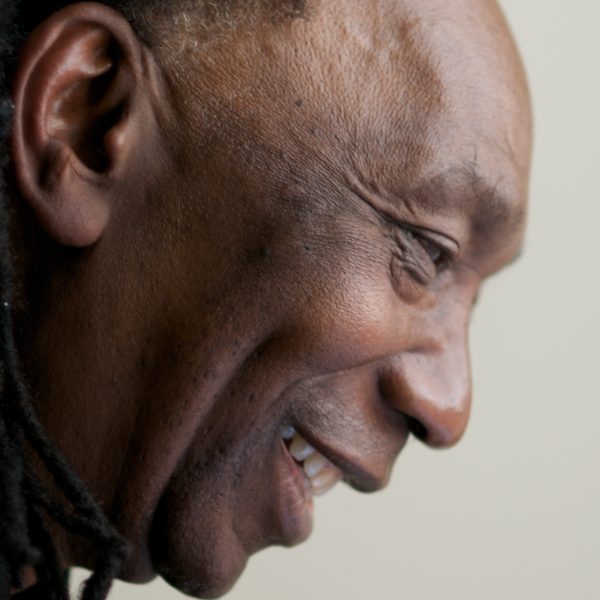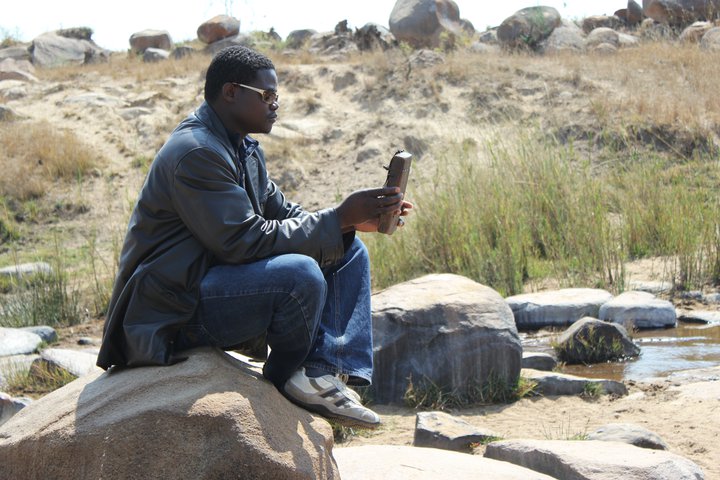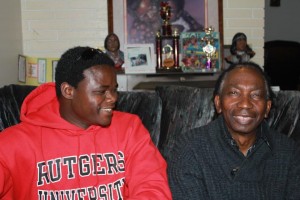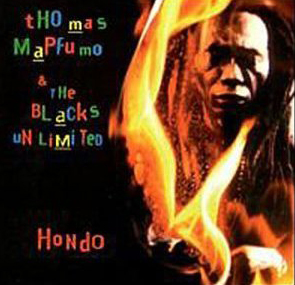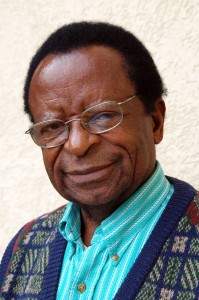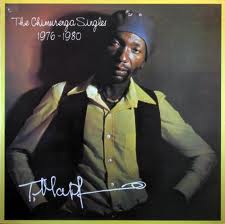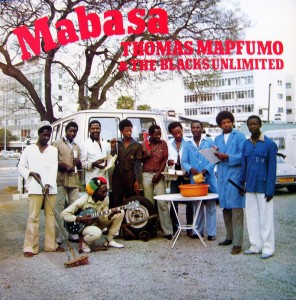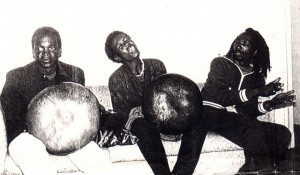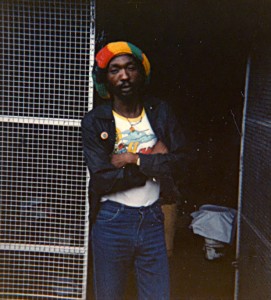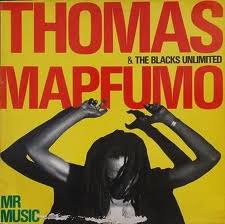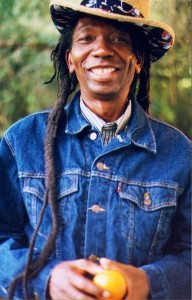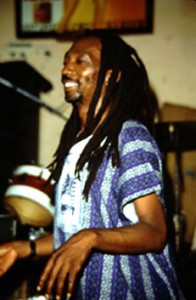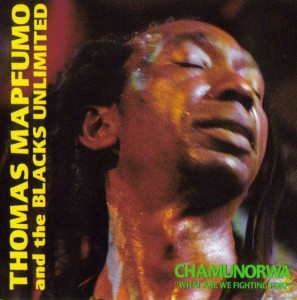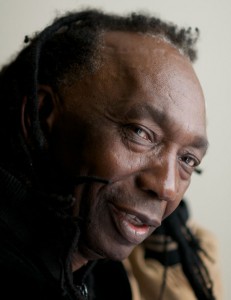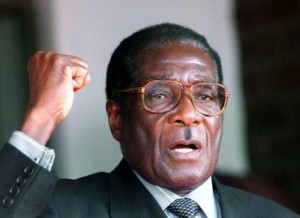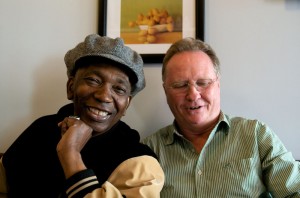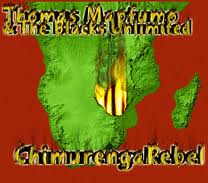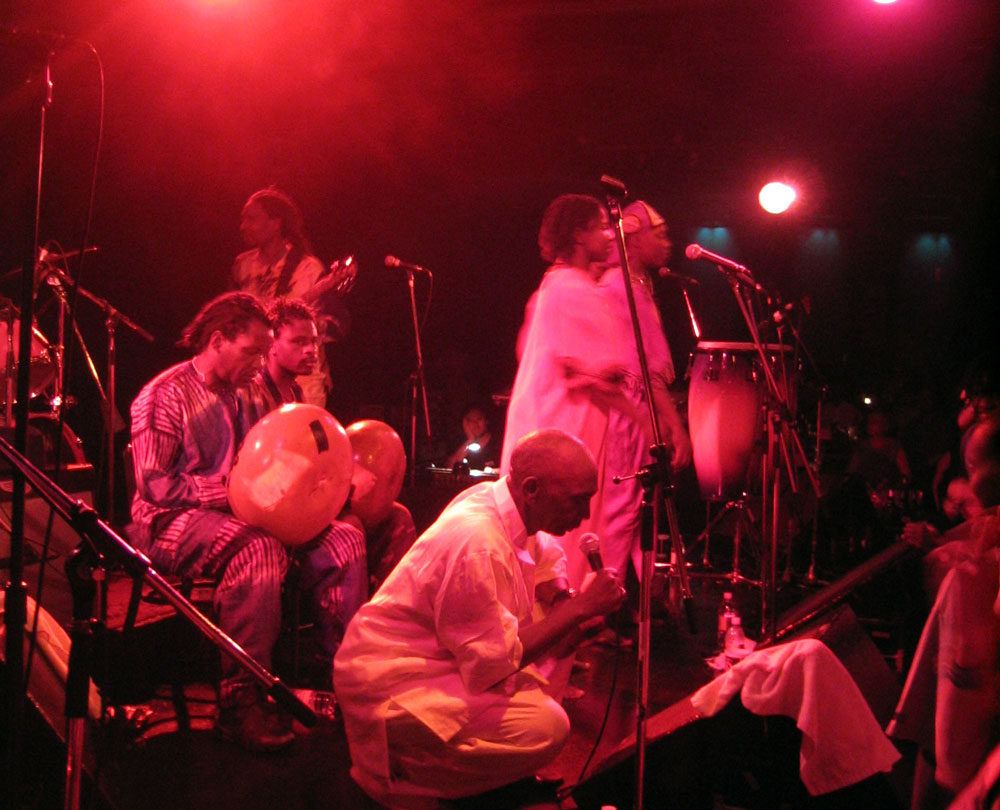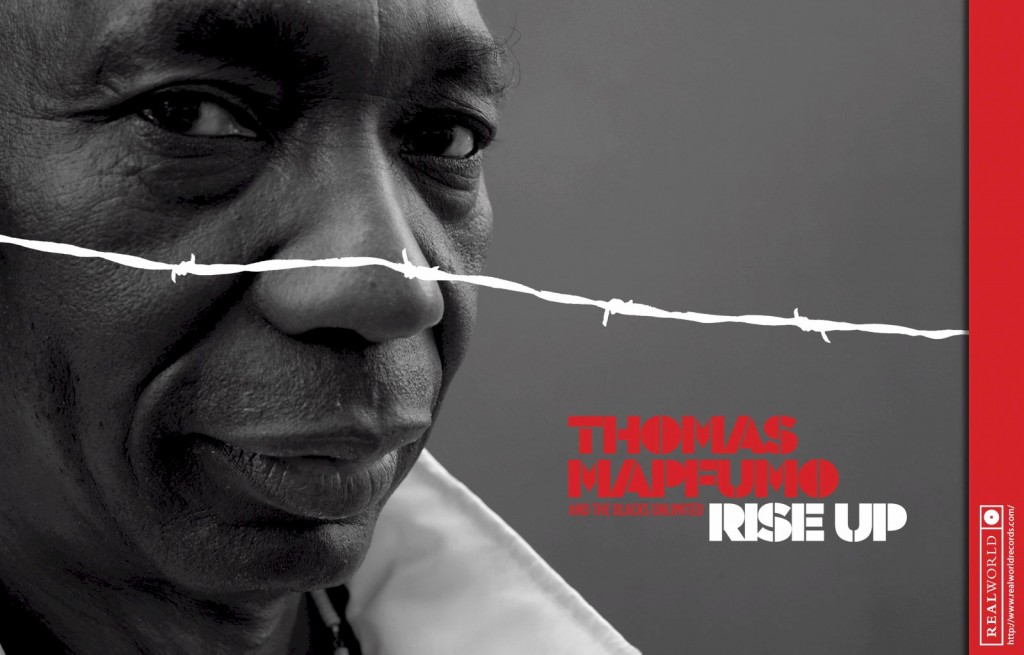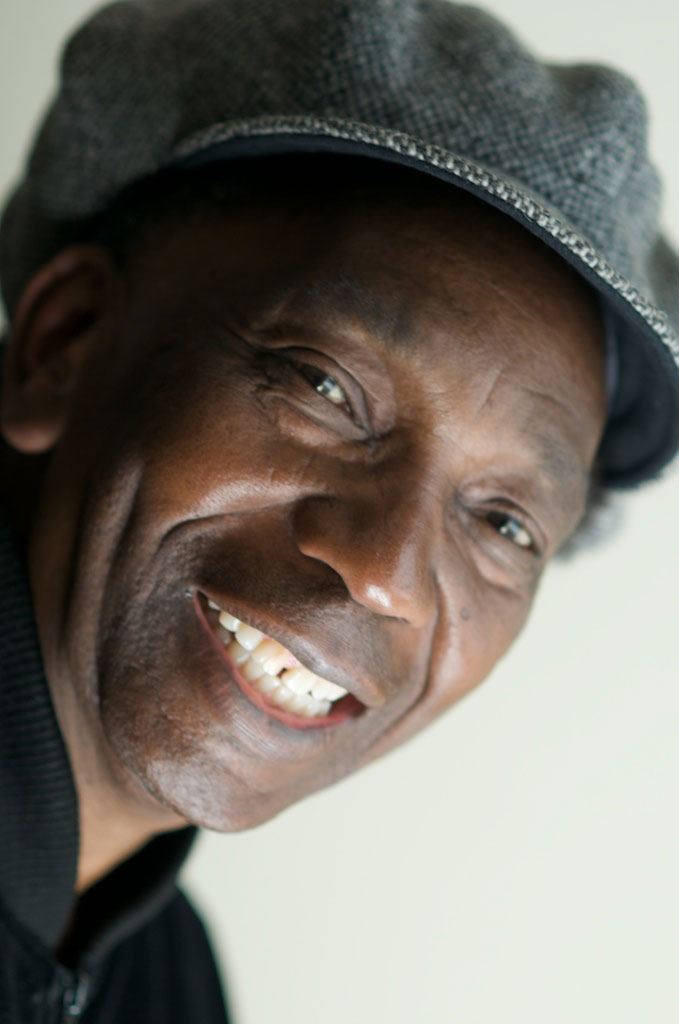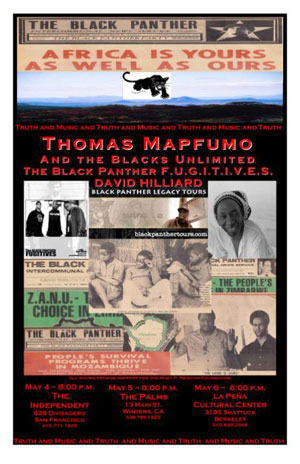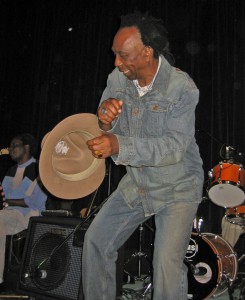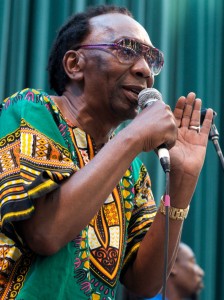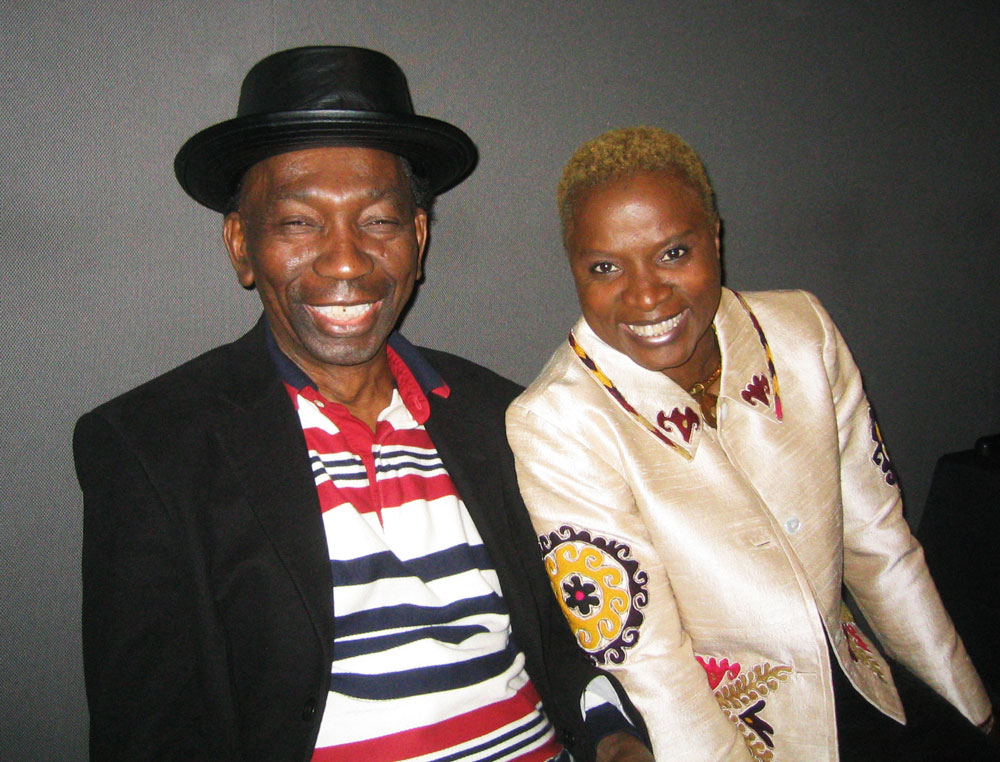Mhoze Chikowero is a Professor of African History at the University of California, Santa Barbara. He has recently completed the first of two books based on his PhD research on Zimbabwean colonial and post-colonial history. That book, African Music, Power and Being, Colonial Zimbabwe, deals extensively with the role of music in the shaping of modern cultural and political realities in Zimbabwe. Chikowero is also a lifelong observer of the music and public life of Thomas Mapfumo. That’s why Afropop’s Banning Eyre interviewed him for the second installment in our Hip Deep profile of Mapfumo: “Thomas Mapfumo, Part 2: The Mugabe Years.” Here’s the complete text of their conversation.
Banning Eyre: Mhoze, to start, please introduce yourself. Tell us a little about your personal background—where and when you were born.
Mhoze Chikowero: My name is Mhoze Chikowero. I was born in 1972, in central Zimbabwe, Mhondoro, to be specific. It was the early 1970s, when the country was really in the throes of the war of Independence, so I could've gotten a different name, maybe a name that would referenced the war, as was fashionable then.
B.E.: What is the significance of the name Mhoze?
M.C.: Well that's a name that was plucked from the Bible--Moses. And that's part of the story we will be talking about today.
B.E.: So you grew up with the country. 1972--some people call that the real beginning of the war, isn't that right?
M.C.: Yeah, that was a stage in the war when things were really heating up.
B.E.: Talk about your personal experience of Thomas Mapfumo’s music. When you first heard it, what it meant to you growing up. We’ll get to the analysis of his art, but to start, I want to know how it affected you before you became a scholar.
M.C.: Well, you grow up in a particular kind of musical context. So unless you begin to really think about things intellectually, to conceptualize issues, as a scholar, of course, you are thinking about things differently. So Thomas is one of those people that any average Zimbabwean boy or girl would hear on a day-to-day basis, one of the people who really framed what Zimbabwe music meant. We are not isolating Thomas necessarily. There are a lot of big names today that really emerged in the same period. I'm thinking of Oliver Mtukudzi, who is actually touring this country as we speak.
B.E.: Yes. I'm going to see him this weekend.
Mhoze Chikowero and Thomas Mapfumo
M.C.: And people like Paul Matavire, and others. So this is music that really emerged from the Zimbabwean cultural and political context of the time, that really reached a crescendo in the late 1970s. So this is music that talked about the day-to-day life of Africans under colonial rule, struggling to free themselves. If your family owned a gramophone, that is the kind of music that you were likely to hear. If you were growing up in the rural area, you were likely to be doing your shopping at some shopping center, in the rural townships, as they are called, and that's the music that you go there to listen to. Of course, Zimbabwe was not exactly divided between the rural and the urban, even though the colonial design was to do just that. But people went back and forth, because you're talking about Thomas who was actually living in the city in the 1970s. That's where musicians, professional musicians, tend to operate from. Their music of course references the larger context of Zimbabwe, where they were born, how they grew up, herding cattle, doing those kinds of things that any average boy does as he grows up. So the music does not reify that rural -- urban divide. If anything, it naturally references the mobility that arose through labor migration between the rural and urban areas in Zimbabwe. So again, if you go to town, that's the music you listen to. If somebody comes back to the rural home from the city at Christmas, that's the music the younger siblings at home look forward to dancing to.
B.E.: You, yourself, when do you first remember listening to Thomas's music. And wasn't in the country or the city?
M.C.: Well, as I said, it's kind of difficult to pin that down because you grow up in the context of the music with really thinking too much about it.

Eastern Zimbabwe landscape (Eyre 1993)
B.E.: So you yourself moved back between the country and the city when you were young?
M.C.: Yes, which is kind of the normal trajectory for most people. My father, and many fathers at that time, worked in the city, in the factories. The idea behind colonial economics was of course to extract African labor. So fathers and boys would be working in the city, leaving the family back in the reserve. And of course there would be that back and forth movement between the two spaces. So that during one school holiday, you are lucky to go to spend a few weeks with father in town, taking the opportunity to get a new pair of school uniforms or something. Or your mother takes you there, or sends you, following up on father who has skipped a month-end home visit or two. During the war the cities became the refuge as most rural families ran away from the war, spending a good many years in the towns. But the war followed you there in the cities in songs of people like Thomas but also the distorted Rhodesian state media.
B.E.: So, were you particularly interested in Thomas's music then? Or was it just part of the catalog of music that you described?
M.C.: Well, that would come later on when I could especially choose what to buy. Because what I remember, when I could put my own money on music, to buy good music—in the 1990s, more than a decade after independence—my first purchase was Thomas's album Hondo plus the odd Jamaican reggae cassette. But while I grew up I listened to all kinds of music, with the family, wherever I was visiting, or wherever I happened to be at a growth point (rural shopping center). And the music that was being played there tended to be popular music, with Thomas in the mix in terms of defining the popular.
B.E.: That's great. I love that your first record was “Hondo.” Now let’s shift gears a little. Tell me about the focus of your work as a historian.
M.C.: Well, as a scholar, I do quite a number of things. I am preparing to send to press my first of two books on Zimbabwean music history: African Music, Power and Being, Colonial Zimbabwe. And beyond music, I am also working on a socio-economic history of electrification, which is basically the mechanization of urban space through electricity. That actually touches quite a lot on the subject of music. So what I am doing with that project is basically to look at how the cities in Zimbabwe were divided, specifically racially. Dividing where whites could live and where Africans would live—that is, in the ghettos. So these kinds of technologies like electricity are quite key in terms of larger social histories; they impinged on how you would enjoy your leisure. You need power to play music. A different book project – which I am about to finish – is about radio broadcasting, which is an offshoot of my research on music. That project is tracing the history of radio broadcasting in colonial Zimbabwe, Zambia, and Malawi from the 1920s.
B.E.: Interesting. I should have interviewed you for the first Mapfumo program. But we'll move on. Our story this time picks up at Independence in 1980, a difficult moment for Thomas, coming off the controversy where he had been imprisoned and forced to play at a rally for Bishop Abel Muzorewa as a condition of release. Muzorewa was, of course, part of the so-called “internal settlement,” a short-lived attempt to end the war short of full independence. How would you say Thomas reestablished his reputation in the early months and years of Zimbabwe?
Abel Muzorewa (Eyre, 2005)
M.C.: Yeah, you are quite right. There has been some kind of debate, an undying debate, as to whether or not Thomas sold out, whether he had become a sellout. And that really affected him. That affected many people who had really taken Thomas’s music to be some kind of icon, an optic into things. But I think that debate itself is important to talk a bit about before talking about his reemergence from that disaster. I think the context again is important. If you look back, at least part of what I'm doing in my music book is to show how African music has really been a domain of struggles—struggles for power, right from the advent of the European settlers and missionaries in the late 1800s. That’s important because people who engage in this debate don't reflect that larger context of struggle and contestations, where the colonial state was actually appropriating African music to legitimate its own governance. And part of how Africans responded to that appropriation was to remain consistent and use their own music to free themselves, something Thomas actually perfected in the 1970s. So that is not a new kind of dispensation. Politics and politicians have always been at the front of popular consciousness, trying to use popular voices for political purposes. So I think one thing that really allowed Thomas to survive was consistency.
If you look at the interviews that he has given, and I don't doubt his explanations, he has remained consistent in his own stance. I don't personally know any song that he actually performed celebrating Abel Muzorewa or Ian Smith and the Zimbabwe-Rhodesia regime. So I think it is that consistency both at the shows where he says he performed the same very piercing chimurenga resistance songs. So even though many people in ZANU became kind of sold on the idea that Thomas had sold out, I think that consistency, singing the same songs that defined him in the 1970s, and also his new discography of the 1980s, celebrating independence and charting the popular hopes—that, I think, is what really defined him. So eventually, of course, people came to realize that Thomas hadn't changed.
B.E.: I like that that you look at the actual songs. I did my own research on that, and if you look at the songs he actually recorded during the brief time Muzorewa was in power, they are anything but conciliatory to new government. So that's very well said. It was the consistency of singing the same songs, and people heard this on the radio. People might say what they would about the rally, but you look at the man and his work, and there's consistency. That's what really allowed him to regain its stature.
M.C.: Yes. But also, people are kind of tending to underestimate the power of what James Scott calls "the hidden transcript." You can perform on any platform. If you’re a clever musician in Zimbabwe, you can accept invitations to perform by any politician—politicians of any shade, but that does not necessarily need to define what you are doing as an artist. And also, in terms of engaging power, that’s a strategy that Zimbabwean musicians have perfected of late. I don't know if you are familiar with the musical galas that define music in Zimbabwe in the 2000s.
B.E.: I have heard about them. I never went to one. But I'm familiar with the concept, political musical events.
M.C.: Yeah. So the idea, the kind of popular perception has been that, well, all these musicians who have been sponsored by the government, they have been invited to come and perform for ZANU-PF; that they are simply instruments of government propaganda. That they are singing from the belly of the beast and they are therefore a part of the beast. But, if you listen, even if you watch the performances, some of the musicians are actually doing something totally different. The limit is with us observers. We don't always think about how artists can actually subvert systems from within, from the sponsor's official platform. So in my view, that is what happened at the Bulawayo rally where Thomas supposedly performed for Abel Muzorewa.
B.E.: Many of Thomas’s early-80s songs focus on rebuilding life after the war. I’m thinking of “Rita,” “Chauya Chirizevha,” “Mabasa,” maybe “Chitima Cherusununguko.” Talk about this aspect of Thomas’s message during this period.
M.C.: Mapfumo’s music becomes one element in a larger atmosphere of euphoria about independence where you have popular musicians, many who sang the songs that won the liberation war, as Professor Alec Pongweni put it. They are continuing to produce such music, but they have actually moved a gear up. It is no longer time to really struggle in the sense of fighting with guns, but to build, to rebuild. So songs like "Mabasa" which means “work,” or “Chitima Cherusununguko,” which means “the freedom train,” these are kinds of metaphors that are quite useful in terms of thinking about what people were doing at the time. After two decades of grueling fighting, of destruction, violence, and hatred, the idea of building or rebuilding a new postcolonial African nation state called for unity. It called for a spirit of cooperative development that even the nationalists were espousing during the 1960s and 70s. That is what defines the goal of this struggle, to do this thing together, to come together, the idea of cooperatives coming from both socialistic ideologies borrowed from our Chinese and Russian friends, but also the common historical, communalistic ways of doing things in African societies.
So that's not a new message. There is a realization that that's why we went to war. Now what do we do? We must go back to work. We must cooperate to do things together. So the spirit of cooperative development becomes a defining message. Unfortunately, there wasn't enough of that kind of spirit, especially at the level of policy. There was no concerted effort to actually think about social transformation. That question was really never raised. It was kind of pushed aside while people danced, and politicians did things.
B.E.: Yes, they "did things." Well, that's interesting. So that spirit of rebuilding and coming together and cooperating -- the people felt it, but not necessarily the leaders in power. They didn't really implement that kind of vision.
M.C.: I wouldn't say they didn't totally. Because if you remember, the model of development had already been tested during the war itself, in the liberated and semi-liberated zones where ZANU especially was actually setting up these cooperatives, and where it was training fighters. Even in the war camps in Mozambique, Tanzania, and elsewhere, they were teaching these combatants to be able to do things using their own hands, things like carpentry, welding, those kinds of skills. Because many of the youngsters had left school to go and train and become guerrillas. So ZANU's program, its educational program, did not forget tomorrow during the war.
Of course, this was again going back to the pre-colonial period, to where people did things together. The concept of "nhimbe," "mushandira pamwe," where people work together, where societies really attack issues collectively. So post independence, in those early years, you see massive investment of energy and capital into rebuilding. There were no schools really for Africans during the colonial period. The colonial design was not to educate Africans, to equip them intellectually or in terms of real-life skills, but just to create cheap laborers. So there was that investment in schools, whereby I built the school that I went to with my own hands, where I carried the bricks to build my own local clinic. My own parents were involved in building schools, clinics, roads and other structures, even large infrastructure projects like dams and bridges, so that people would actually be able to irrigate their crops at the local level and to transport this and sell to the local grain marketing depot. There was massive, unprecedented investment in those kinds of projects.
So these are the kinds of issues that Thomas and others were singing about. “Mabasa.” Everyone is going back to work. He is looking at people working in the fields. There is now peace. “Chirizevha Chauya.” The traditional life in the reserve is back. So there is that emotive involvement, but if you really think about the concept of the reserves, there are limits as to the kind of reimagining that you see in songs like “Chirizevha Chauya,” “Mabasa,” and others. Because the reserve remains a reserve. This is where Africans had been shunted to under colonial land policies. And one of the agendas of the liberation war was to restore, to give Africans back the land that they had lost under 100 years of colonial rule. So songs like “Chirizevha Chauya” that celebrated life coming back in the reserves are happening within those limitations. But of course, Thomas is a musician.
B.E.: And also a person who himself grew up on a reserve, Marondera, so that was a natural point of reference for him. It was a natural way for him to experience this emotion of coming together in rebuilding. Let's talk about a song with a very different kind of motivation behind it. What is your interpretation of the song “Nyarai”?
M.C.: "Nyarai" means "Be Ashamed of Yourself.” And again, the context of that and other songs is the early independence political atmosphere, where the nation has just emerged from a violent confrontation, and where people have these hopes that, well, now we are going to join hands and do things together the best way we know how. But that moment of birth was not exactly without its own problems. The 1980s in Southern Africa were really a troubled time, with all those destabilization programs by the apartheid regime of South Africa, including the sponsorship of the so-called civil wars in Mozambique and Angola. And all these forces actually I think fed into the local situation in Zimbabwe, with the talk of "dissidents" especially in the western part of the country, which was actually a real problem. That is the context I think that Thomas captures, and not just Thomas but others as well. Elijah Madzikatire and others capture this in their songs. What exactly did they know, and mean? What was the extent of their knowledge of what was happening in Matabeleland, especially in terms of the government’s response to the problem. That is subject to debate.
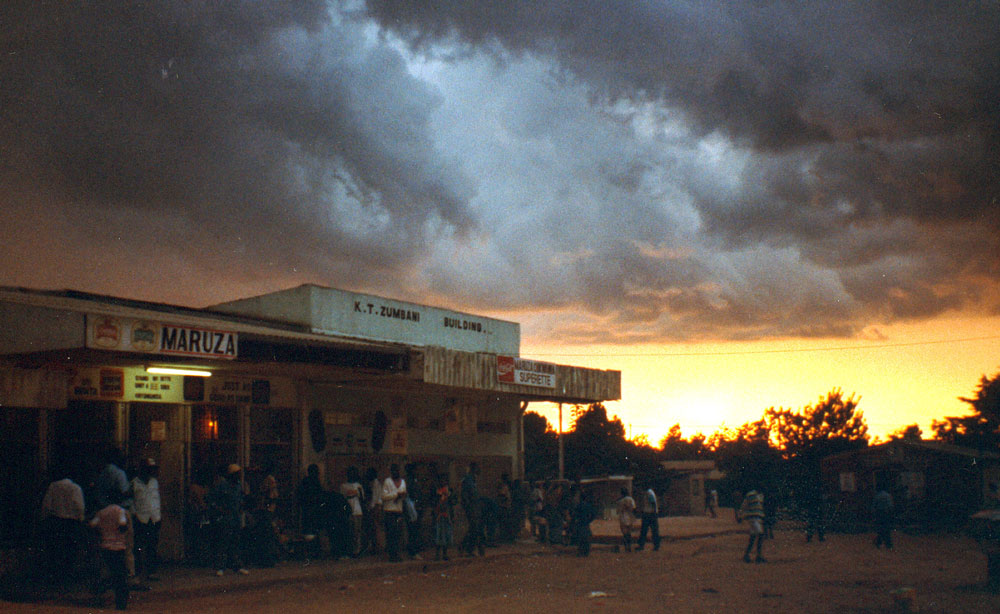
Growth point shopping center (Eyre, 1997)
B.E.: Okay, and that brings us to the song “Nyoka Musango?” Thomas said in an early interview (1988) that it was about “dissidents” as you just mentioned. This was before people fully understood the devastation caused by Gukurahundi, the government’s brutal campaign of suppression in Matabeleland. Later, Thomas distanced himself from the idea that this song had anything to do with Ndebele resistance to the new order, but there is some ambiguity here. Please comment if you can.
M.C.: Right. When I think about that song "Nyoka Musango," "Snake in the Forest" or "Snake in the Bush," that's a song that could be interpreted in different ways. There are other songs that precede it, like "Nyama Musango," "Meat in the Forest."
B.E.: That's a traditional mbira song.
M.C.: Right. "Nyoka Musango" itself, in the context of war, early postwar, I think it could reference problems that many people saw and understood as continuing problems. You are talking about things in a context that is being really controlled by politicians, who have control over the media. In the context where, especially in western Zimbabwe, people could not actually travel from one point to another without official clearance. So there was control of information and movement. So what Thomas knew, what other Zimbabwe's knew, I don't know. I didn't grow up in western Zimbabwe myself. So these are things that you would learn later, especially the violent government response to the problem, which as I say was a real problem, of dissidents. There is an understanding, a common understanding that government over extended its hand for political purposes, not necessarily really to deal with the real problem of a new insurgency, which people like the president of Botswana at the time writes about in his memoirs as a real problem. This chapter is independent Zimbabwean history is yet to be thoroughly researched.
But it is important to observe that we are really talking about the game of power, which in many situations like that, the government over extended itself to actually touch on the civilian population. How artists interpret things becomes tied the possible interpretations at the material time and within the quite circumscribed context of communication and struggles for power.
B.E.: I think it's true that most people did not realize the extent to which the government had over extended its hand. As you say, it was hard to get in and out, there wasn't a lot of reporting. In fact, there was a news blackout. So I accept Thomas at his word. He didn't mean that song to be encouraging violent campaign. It's just that when you listen to the song, and you think about what was happening in Matebeleland at the moment it appeared, it is easy to imagine that the people who were doing that violence could have been inspired by that song, because it is so powerful in its militant feeling. I think the music comes from an old Shona hunting song. And it's a wonderful song, one of my favorites. But it did take place in the eyes of history at a very ironic moment.
M.C.: Yes, that's right.
B.E.: Okay, let's move on. Mabasa (1983) was the first Mapfumo album to use the actual sound of mbira, rather than just guitar imitation of mbira. (It made a few appearances on subsequent albums and became a staple of the sound with Varombo Kuvarombo (1989).) What was the significance of that development—bringing in the actual mbira instrument?
Mapfumo's early mbira players, 1984
M.C.: What Mapfumo had in mind I'm not too sure. But the mbira is really one of the quintessential African musical instruments in Zimbabwe. In the context of the colonial politics of culture, it represented everything that was wrong with African culture in the eyes of European settlers and the missionaries. So the mbira had taken a serious buffeting, right from the 1800s through the decades. I explore that cultural violence in three chapters of my book. The mbira is one instrument that really was a metaphor in the suppression of the indigenous, not just music, but cultures, ways of knowing, ways of doing things, indigenous knowledges. So it is not surprising that this is an instrument that had been at the forefront of defining how Africans conceptualize music prior to and during the colonial decades.
So, with independence, that is the moment I think that opened space for Africans to freely reimagine what it meant to be an African again. It was a moment for cultural restoration. And the mbira was coming back slowly. Many musicians in the villages and a few professional musicians had continued to play this and other culturally significant Zimbabwean instruments, defying missionary conventions and repression. But in terms of defining popular music, that's not the kind of music that the record companies marketed. This is an instrument that had been alienated in the popular African imagination. But independence really opens the door for people to come to terms with themselves. So that is the context in which to think about mbira as an instrument and symbol. If you listen to Mapfumo's works in the 1970s, you can see that train moving towards that reintroduction of this quintessential instrument. The guitar itself had been kind of formatted around the sound of the mbira. And this is not just Mapfumo, but also Mapfumo's uncle, Marshall Munhumumwe (The Four Brothers). He was quite instrumental in his own recordings. He too became an expert. But perhaps the driving force in terms of codifying the musical instrumentation of the Blacks Unlimited around the mbira/mbira-guitar was Jonah Sithole. Mapfumo’s work with the mbira was part of that process. New cultural policy could have helped, but actually it didn't.
B.E.: It was a process that was leading towards the development of actually having a mbira in the band. But when you say there was a “policy that could have helped but didn't,” what do you mean?
M.C.: What I mean is that if you look at radio and popular perceptions, and that lack of social reimagining, that lack of social transformation at the moment of independence, many of the same alienating ideas that commanded popular conceptions of what it means to be “modern” were never rethought. So rethinking what mbira means in Zimbabwen culture was kind of left in the hands of conscious musicians. The government was instrumental in the establishment of the Zimbabwe and National Dance Company, but I don't know to what degree it incorporated mbira or valued it as a national treasure.
B.E.: Right, I understand. This ties into the history of the Kwanangoma School of Music in Bulawayo. As I understand, the idea there was to treat traditions as art forms, separated from the spiritual, or deeper cultural aspects of the music. It was all about performance aesthetics, not meaning.
M.C.: Which is not surprising. It's not surprising because, well, who are we talking about when we talk about policy? We are talking about the cultural “children” of the missionaries. These are people who had been involved in the cultural nationalism in the 1950s to the 1970s. But this really did not strike its roots deep, and it didn't bear fruit at independence. That dancing with indigenous cultures became still born, rather than a fillip for social transformation when we threw off the colonial yoke.
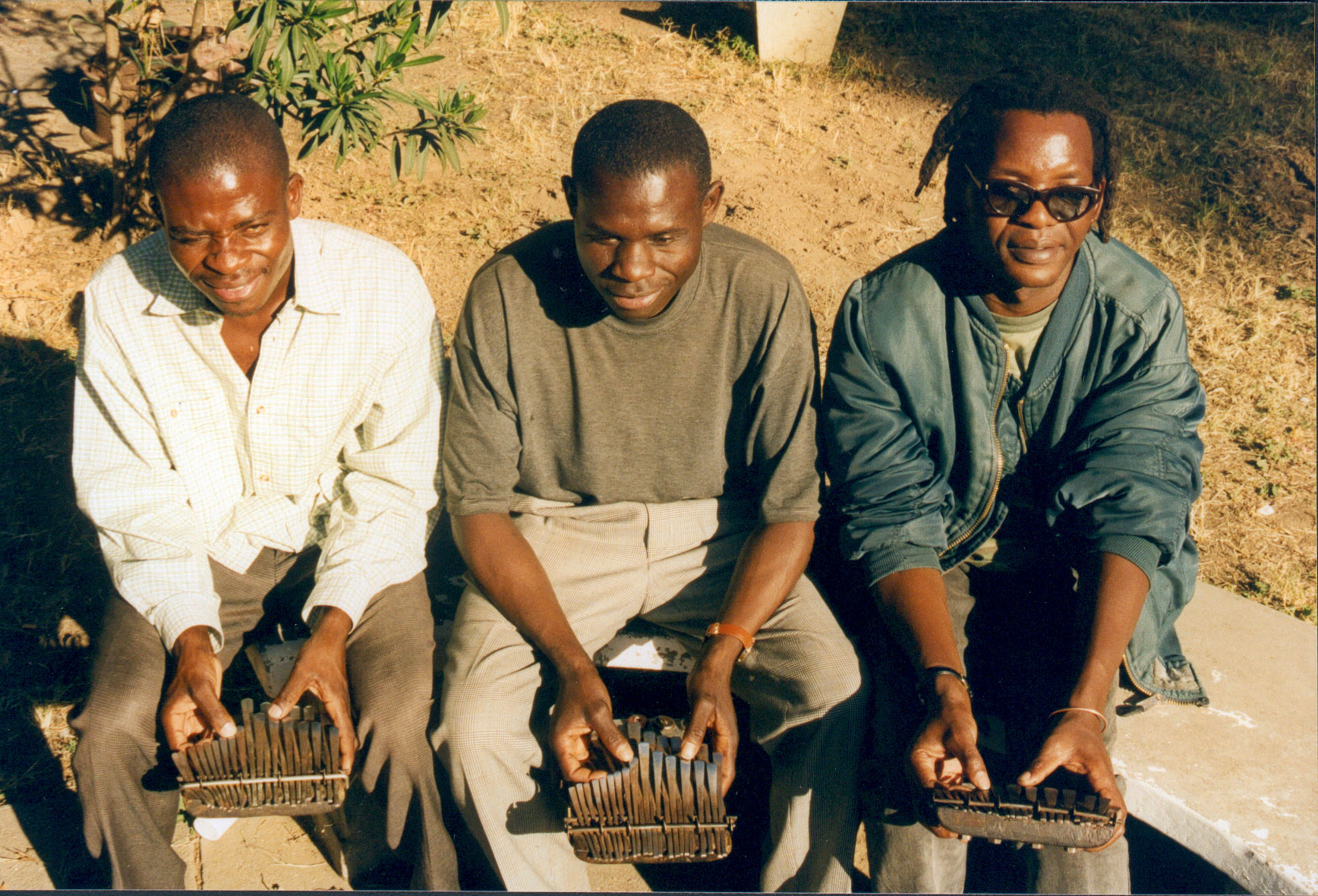
Blacks Unlimited mbiras 1998 (Eyre)
B.E.: I see. So the people who developed policies were those who had been educated by the missionaries, so it's not surprising that they would have continued to have this sense of distance from older culture, and especially the religious aspects that would be associated with mbira. Is that what you are saying?
M.C.: Yeah, that's right. They were mis-educated, and happily, it seems.
B.E.: Okay. Good. The poet Musa Zimunya, who was a major voice in our first Mapfumo program, detects the first notes of criticism of the Mugabe regime in Thomas’s 1984 song “Congress.” Zimunya hears sarcasm in the idea that snakes are being invited to the congress, and things like that.
Mr Music, 1984 album with "Congress."
M.C.: Yeah, well, I think Zimunya is correct in that reading of "Congress." But again, I don't think there's just one dimension to the song. I think it's the same kind of train of thought and perception that you heard in "Mabasa," where he is really celebrating the model of development that is cooperative. So the idea of unity is one that even the ZANU Congress, where he performed that song, was also promoting. But of course, it's a Congress. So everyone is there, everyone has to come, everyone, including Snake, is welcome. And yes, it can easily become a different kind of Congress were people with different motivations, people who don't exactly represent the ideals of the struggle have become policymakers.
B.E.: Thomas himself points to the 1987 song “Nhamo,” meaning “trouble” or “problems.” Seven years after Independence and still “we are living with problems.” Any thoughts on that song?
M.C.: Well, again, the idea behind this popular euphoria, that we had become free at last, was there. But what we lacked at that particular moment was the idea of rethinking structures and systems and ways of doing things. The popular investment into social programs was something that actually earned government popular approbation. Many people of my generation, beneficiaries from the education system that wasn't there a decade earlier, felt this way. We had high expectations. But those social programs were not exactly based on solid economic foundations. The commanding heights of the economy, if you want to think in terms of socialist discourse, they remained unreformed. The money the government was investing in social welfare and social programs was coming from the very same neocolonial structures. The land had not been redistributed. The industries were still being commanded by international and foreign capital. There was no clear formation of policy as to how to grow indigenous capital, a local middle class that could invest in its own capacities and in its own communities. So there was a limit as to what you could do with money that was not yours.
So "Nhamo" was always there, lurking on the horizons. You see that very clearly with the new austerity measures and the shock therapy that came at the end of the 1980s, where the World Bank and others international financial institutions’ sponsored-policies were implemented in Zimbabwe. So the signs I think had always been there, especially with the emergence of a new rich political class that could be bought that Mapfumo sings about in "Corruption."
B.E.: That's the next song we come to. And that's the point where it becomes very clear that Mapfumo’s attitude towards leadership has changed. Talk about the inspiration behind and affects of the song “Corruption” in 1989.
M.C.: "Corruption" was a clear commentary on the motor vehicle scandal involving the Willowvale car dealership. This became known as the Willowgate scandal. Politicians were basically using their power to access limited resources, government subsidized industries, purchasing those vehicles to resell them for personal profits. The regime of rationing things was in effect. So you are looking at a class of people, which should actually be leading social and economic transformation, and they are using their power in unrepresentative ways, for self-enrichment. So you see the beginning of the emergence of this wide divide between the new rich and the have-nots, who continued to actually struggle to survive. And this would be worsened by the economic structural adjustment program (ESAP) that the leaders brought in from the IMF and the World Bank, a program that was actually never meant to work for the poor in the first place.
1990 international debut release
B.E.: And from that point on, Mapfumo has quite a different relationship with the national power structure. In the early 80s, he was embraced as something of a national hero. But now he's sending a message that is difficult to hear for those who were once his champions in government. That was a difficult moment, wasn't it?
M.C.: Well, it was. It was for Mapfumo. It was for the people in power. It was for the person on the street. The government had kind of become used to the message of lionization, the celebration where musicians would sing leaders’ names. They were not used to criticism. They were heroes of the struggle. So they didn't take lightly, of course, to criticism. But that's one thing I think that has remained. We talked about consistency in the beginning. That's one thing that remained in the musical imagination of Thomas Mapfumo as an icon of popular consciousness in his Chimurenga music, which is why Chimurenga music continued, and remained as a definable kind of musical thinking.
B.E.: Because it had a new context in which that spirit of rebellion made sense in a whole new way. So now we come to the 1990s. Give us a historical overview of Zimbabwe in the 90s. Talk about the politics, economics, social changes—whatever you think is important. You might refer to some of the Mapfumo songs that respond to the situation. Some candidates: “Jojo,” “Hondo (War),” “Mukondombera (AIDS),” “Chidza Chepo (The Founder),” “Asingade (He Who Disagrees),” “Mvura Ngainaye (Rains Must Come).” These are all songs that are talking about conditions, political, but also physical, like the drought that's addressed in "Mvura Ngainaye."
Eugene, Oregon (Barnett, 1999)[
M.C.: Well, the 1990s came as a new era where the national body was really kind of poisoned. The body politic was a diseased body. I talk about the lack of social transformation. A lot of issues had not been addressed. People who had been affected by the war had not really been taken into account in terms of policy making. The war veterans who had left school, people who had left their families to go and fight to free the country, came back, and there was no comprehensive program to try to re-integrate them, not just economically, but also culturally. Because the war affected people psychologically. In Zimbabwean cultures, you don't kill a person. If you kill a person in the context of war, there should be cultural processes to cleanse that individual for his own good and for society's good. A lot of those things were not fully addressed. A lot of the fighters’ bones continue to lie in the forests. There were some programs to rebury the fallen heroes, but not enough of that was really done.
But songs like "Mukondombera" and "Mukadzi Wamukoma," and others—again, the concept of a diseased body politic I think summarized what was happening. This is really a troubled time where the new epidemic of AIDS is rearing its head, but again, AIDS itself is a public health issue, but it was not divorced from the politics. It was not divorced from the history of colonial violence, and the reorganization of African society. Because AIDS, if you follow its trajectory, it is following the same itinerary of the reserve, the compound, the location, which were spaces of intensive colonial labor extraction, consumptionism, and deprivation. These become the nodes in the spread of these kinds of problems, this disease. So policy again did not address these things quickly enough. So the 1990s came as an era of deferred hopes and disenchantment.
There was an attempt with the land redistribution process, which wasn't carried through in the 1990s. That had to wait until things could find their own way, after 2000.
B.E.: Now it's interesting that you make the connection between the idea of a diseased body politic and a song like "Mukondombera," ostensibly about AIDS. Perhaps Thomas himself was thinking along those lines when he wrote the song. But why do you think the government was so slow to realize and embrace the challenge that AIDS presented, as you say, as a public health issue. I mean, it was something that was clearly going to have to be faced sooner or later, but they were very slow to understand that and to educate people about it, even just about how to inform people about how you get the disease, and how you avoid it. And I think that that song of Thomas’s, when it came out on the album Hondo, 1992, was the first song sung by a popular Zimbabwe musician. And it's pretty straightforward. It's doing more to educate people about this threat than anything the government had done. But why do you think they were so slow to respond to this crisis?
Harare, 1988 (Eyre)
M.C.: I don’t know if the short answer is that this tended to be the disease of the poor. Thomas sang "Mukondombera," which government could have used to really raise awareness over these issues, and to educate the people. Paul Matavire and a few others also sang songs about the disease in very straightforward ways. So the government was slow, partly because, and partly with the result that the disease and the sickness became stigmatized, and so nobody really wanted to talk about it. But I think there is a larger history to this kind of response to new, “intimate” diseases. It is catastrophic, but if you look back to the 1920s, even the 1890s, not just in Zimbabwe, but across the continent, if you follow the Uganda railway line, you see that these are the kinds of itineraries of epidemiology, disease outbreaks. So these are very modern sicknesses, and they are tied very intricately into the reconfigured colonial economies in African society. Again, there was no larger view of things. There was no questioning the new ways of knowing or policymaking after independence.
That was the time too when you had new kinds of discourses about rights. Equal rights. Women's rights. And those were framed in very neoliberal ways, in the same ways that the economic policy would be framed. Because women's rights tended to be (mis)interpreted as meaning the right to do what you want, to wear things like miniskirts that a lot of people in our conservative African cultures had problems with. So because these tended to be sensitive issues, they didn't want to be caught talking about these kinds of things, and they tended to back away.
B.E.: Even the government didn't want to talk about these things.
M.C.: Yes, well, the government took a lot of flak for its treatment of women assumed to have been prostitutes in the cities in the early 1980s. They were rounded up Murambatsvina style, and thrown away in far away rural areas where their alleged mischief would not sully the air. So this was part of the larger crisis in terms of rethinking African being at independence. Throwing away supposedly single women alleged to be engaging in prostitution was not the most brilliant way to address questions of sexuality-related epidemics or engaging the national cultural question.
B.E.: No, indeed. That’s amazing. I want to ask you about the song "Jojo," talking about the way the regime used young people, people without money, to carry out intimidation. Many died. This was pretty shocking song when it first came out. Talk about that little.
M.C.: "Jojo" is a commentary again on the new kinds of unrepresentative politics, or ways of doing politics. It's a politics that kills, instead of a politics that resolves issues and solves problems. We have systems that are really there to promote the retention of power, and personal power for that matter. So, again, this was a divergence from the ideals that people had supported throughout the struggle for self-restoration. And of course this becomes a key theme in Mapfumo’s songs, where the old colonial masters have been chased out of town, but you still have their shoes remaining behind. The new rulers simply put them on. They don't do things in ways that are vastly different.
B.E.: And I think also that Thomas had a special feeling for young people, especially young men. This isn't far from the time he created his soccer team as a way to uplift ghetto youth. He has a real feeling for young guys who are being corrupted and used in ways that will ultimately destroy them. There's a personal compassion that I hear in those songs for that particular group of people, who are kind of vulnerable to being tempted and used by the government. Would you agree with that?
M.C.: Well, of course. Thomas is a father like many other musicians. Think about Leonard Zhakata right now. They are commenting on the psychology where you can corrupt the impressionable for political gain. This is something that is coming straight from the liberation struggle, where you need to mobilize the masses of the young to actually execute a national agenda. What you do with these masses after the war is won? What you do with them? You create jobs for them. But in a context where the economy has not been democratized for everybody, and is actually quickly throttled by ESAP, then what do you do with the youth who are being retrenched? It's very easy to go the Nigeria way, where politicians have personal vigilantes as their own militias. So that's a culture that was always creeping onto the scene, in light of the role of the expectant young who freed Zimbabwe with the barrel of the gun. And so, I think Mapfumo is warning youngsters and aspirants for political office that in a context where politicians use war methods that, "Hey, you're going to get killed. This is a process that kills." But unfortunately, that reticence that Mapfumo encourages in “Jojo” leaves politics to those people who use muscle; people who are ready to cannibalize their fellows, and the youths for personal power. So because the political arena is left to the jackals, it becomes a dirtier and dirtier game, rather than national service. That's the consequence. People who would want to use different means can't get close to the circles of power. So the politics become exclusive, and the state becomes more and more alienated.
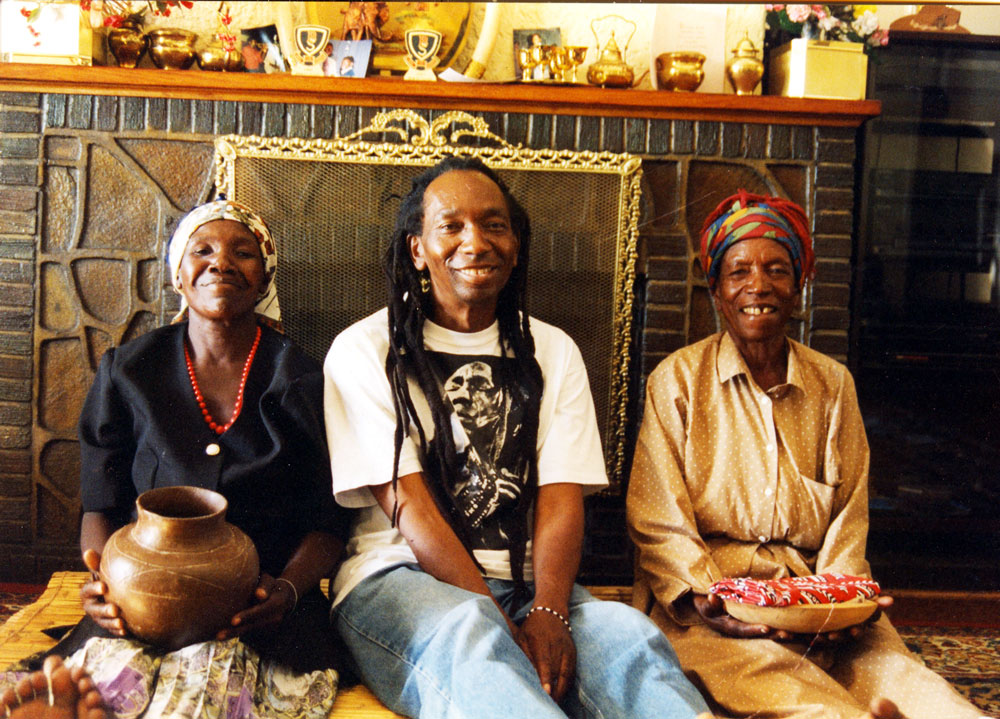
Thomas with mother and sister, Harare (Eyre 1998)
B.E.: The 1992 song “Magariro” crystallizes what we might call Thomas’s cultural message—the idea that people had been stripped of their African identity, and that post-Independence leaders were actually accelerating rather than reversing this process. Talk about this central message in Mapfumo’s work, and evaluate it from your perspective.
M.C.: Well, that's quite right. "Magariro" is a clear commentary on what I've been referring to as these unreformed ways of knowing, ways of doing things. What that really gets down to is the fact that the colonial state was never destroyed. It was just captured and maintained and deployed for the same purposes by a different set of people, without actually thinking about what anchors a system of governance. I have actually analyzed this particular song together with others like “Vanotsenga Mukanwa” (“They mince their words”) in an article titled “Our People Father, They Haven’t Learned Yet,” published in the Journal of Southern African Studies (2008). So “Magariro” is really talking about the festering neocolonial cultural dispositions. Even thinking about this in terms of the languages that people use, African languages that had been alienated, they have not been restored to become recognized languages used in instruction and political discourse. How do you develop when you produce knowledge in other people’s languages when the systems and registers of knowledge are totally different? People speak English on national radio, as if the people have no languages of their own that can weave national discourse.
And people still think, well, all these spiritual and cultural questions amount to primitivity—that kind of missionary message that never went away. These are the kinds of things that again find space in Mapfumo’s musical thinking.
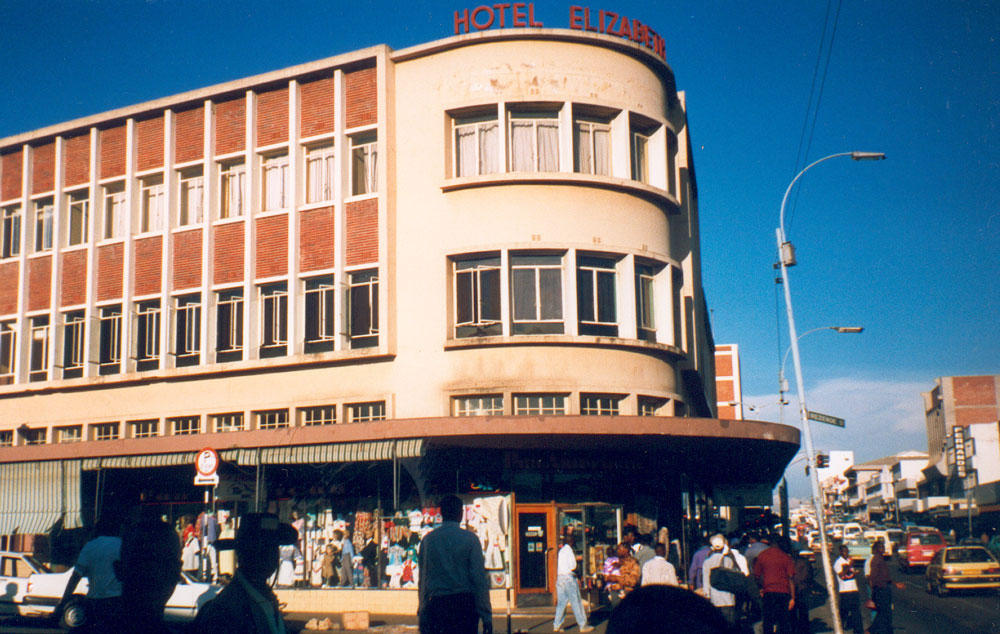
Elizabeth Hotel, scene of TMBU weekly meetings
B.E.: You mentioned that radio is important in your own work. And we know about Thomas's long-standing battle with broadcasters and DJs, who he tends to see as major villains in the cultural front. Talk to us a little bit about national radio and television in Zimbabwe, and how it has treated local musicians, including Mapfumo.
M.C.: Well, what we have is a system, a technology that's been used, that was founded basically on the understanding that it should be used to mold people's lives, to re-create people's minds. Because if you look back at the 1930s, through the 1940s, radio was the key instrument of colonial propaganda, of subject making. This is the philosophy that defined the colonizers’ approach in terms of talking to Africans. So come the Nationalists and the liberation war era, radio becomes an instrument that the guerrillas actually appropriate, and deploy for their own purposes, to fight in the war, to communicate with people who remain back in the countryside, broadcasting Chimurenga music and news from the front. So, as I note in my research, radio is quite a powerful technology in struggles over power; together with the gun. It is key in the whole project of nation-building, starting from the colonial period, through to independence. So at independence, the new rulers know the power of technology full well, and they don’t let go of it.
So the state does not open up this tool of mass communication. Because if you open the space, and you allow multiple voices, contrary voices of opposition, because of course you can’t risk losing public debate—the first step in terms of gaining and keeping power. So radio started in the hands of Africans as a means toward self-liberation, but as I document in my work, the colonial state was never really destroyed at independence, and its instruments, including radio, remained intact, and the new postcolonial state is really an unreformed state. It uses the same instruments, cutting out what might be more popular voices. And in terms of cultural policy, the music of Thomas that we're talking about is very critical music. It criticizes the people in power. So state radio becomes a tool to bring people into line, starting with musicians, and through the instrumentality of money-grubbing disk jockeys. But of course, there's also the commercial interest, so advertisers also tend to dictate what goes on to national radio. If Coca-Cola means “modernity,” the conglomerates promotes a Coca-Cola Hits music program that features American or America-influenced music, the very same music that colonialism taught Africans to regard as civilized; it does not sponsor a mbira hits on radio and TV. Never.
Remember, we're talking about just one broadcaster here. So there is all this swelter of voices of different musics, and musical tastes, and there's only one radio. What happens? Only the preferred music reigns. And that can’t be politically caustic music, or “primitive” music.
B.E.: One broadcaster, state radio, ZBC, and that's still the case right up to the present, isn't it?
M.C.: Yeah, well, almost. There has been slight shillyshallying with the monopoly with one or two non-antagonistic private voices coming onto the fold in terms of radio. And again, if you look back at the history of radio, not just in Zimbabwe, but in the region –naturally, apartheid South Africa was worse—you are looking at technology that was founded on the premise that you need to control the minds of the colonized. So if you look at the Second World War, African loyalty cannot be banked on by the British colonizers, so you use this powerful instrument to talk to Africans. So the concept that really framed radio was this idea of broadcasting to Africans, or to natives as they called them. So the idea was to churn out propaganda, to persuade Africans to support the Second World War on the side of the British, of course. And also to kind of make them loyal subjects of empire.
Radio was later very key also in the marketing of the Federation in the 1950s. So you have federal radio broadcasting from Lusaka, Zambia into Southern Rhodesia and Malawi, Nyasaland then. [These were the three nations of the short-lived Federation.] The idea again was to kind of buy the African mind, to mold the native mind into this British project for maximized intensive economic exploitation of resources, using African labor, for profit. So radio was key. The concept was also that radio could be an instrument to educate Africans. It was really all about educating Africans into subjecthood. So radio is key in making empire.
Africans tended to resist that message that radio designed, so you now have the colonial state bringing in Africans, leading African voices, to try to persuade them to take radio as an important technology for modernity as it was framed. So there were Africans who worked for radio in the 1950s, and some of these become key in nationalist or guerrilla appropriation of this instrument to subvert the state and actually take their skills beyond the line, into exile. When they started broadcasting across the region, broadcasting a different kind of message, the message of African self-liberation. So, again, throughout the decades, you see the purpose of radio is not really changing. It remains the key technology of state making, the key technology for capturing and retaining power. So with a different platform of the postcolonial state, you see radio being used for similar purposes, but by different players.
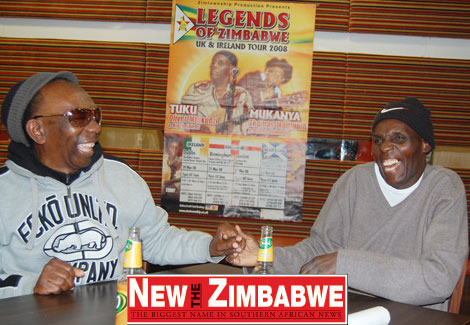
Thomas Mapfumo, Oliver Mtukudzi, London 2008
B.E.: That's fascinating. You know, coming back to the early 90s, I visited Zimbabwe around that time, and I noted then that there was a boom of mbira bands following in Thomas’s footsteps. You had Legal Lions, Sweet Melodies, and bands led by Ephat Mujuru, Jonah Sithole, and Pio Macheka. But a few years later when I came back, all of these bands had pretty much failed. How do we explain the fact that Thomas alone is able to succeed with this music?
M.C.: Oh, that's an interesting puzzle, I would say, but not too difficult to understand. By the time that you are talking about, Thomas has become a brand. So whatever he does, it's easier for him to build interest, to capture the public, but also to persuade his audiences to build appreciation for whatever he turns out. So people like Pio Farai Macheka are trying to follow the same groove, but Macheka specifically was limiting himself to living in Mapfumo’s shadows by trying to sound like him. But I think one of the most important explanations is, again, radio. How much appreciation, how much promotion of mbira do you have on radio? Similarly, how much is the "industry" promoting mbira. In the commercial mind of the record companies, these are not the sorts of things that sell. I saw quite a few dejected musicians complaining about that explanation at Gramma Records over the years. Musicians who recorded, who tried to go back to mbira and traditional styles, they are trying to build an audience from the point of alienation. People are alienated, so that you actually don’t have sufficient public support. The mbira represents the alienation of the African cultural self, and undoing that alienation cannot a simple enterprise of deciding to play mbira and hope to live on it.
So unless you have a big name, and unless the radio assumes a different mentality... But we are really just talking about Radio 2. That's the channel that played African music, all genres of African music: sungura and others. Mbira is a very small aspect of that. So if there's no intention on the policy level to actually promote mbira as an instrument that could be appreciated at a popular level, the opening of broadcasting space might open competition and different kinds of musical styles might find their own niche. But we are talking about a very narrow space here.
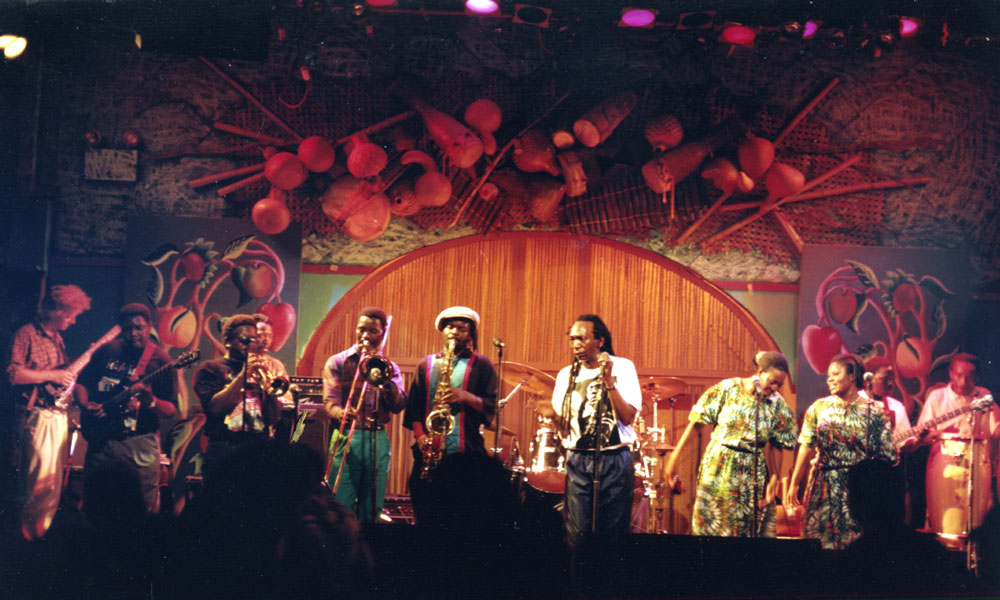
TMBU, SOB's in New York City (Carduner,1993)
B.E.: That's very good, the way you tie those things together. Now when Thomas talks about this, he always points to something else that you referred to, the idea that the people who are leading the government are people who themselves were educated by missionaries, and they themselves harbor a hostility towards traditional culture, the culture that would be represented by something like mbira music. That is not the vision of the future or identity that they are trying to promote using this powerful tool of radio and television. This is why Thomas ends up having this attitude towards DJs, because he sees them as tools of leaders who themselves are hostile towards traditional culture, the very thing that he feels needs to be reestablished, or at least reevaluated. Do you think that's right?
M.C.: Yeah, I think that's correct. The people who are leading the state, these are really the children of the missionaries. And we know missionary attitudes towards African culture. Again, the mbira is basically the icon of African culture. This is a state that has remained strongly anchored in really alienated ways of doing things. So there is that problem of lack of transformation that we talked about at the beginning. It is defining the radio. It is defining how people appreciate things. Young people. People who become announcers. People who play music on radio. These are people who don't think any differently, but also, as I said, one really huge issue is an idea of commerce that is incompatible to local cultures. It is that sort of commerce that commands radio in early independent Zimbabwe, up until that draconian political intervention by Jonathan Moyo to kind of reframe things again for partisan politics.
B.E.: We will come to Jonathan Moyo in a moment. But first, let's talk a little bit about the land issue. Give us a thumbnail history of the land debate in Zimbabwe. It’s a big subject, much reported, and we don’t want to get bogged down in detail here. But see if you can boil it down to a clear narrative—from the Rhodesian seizing of land, to the hedging at Lancaster House, to the early land reform of the early 80s, to the subsequent period of neglect, and then the sudden burst of activity, including farm seizures, starting in the late 90s.
Robert Mugabe
M.C.: Well, that debate over land, the question of land, is really central to political struggles in Zimbabwe. Land itself is really the text of Zimbabwean history since the late 1800s. You asked me at the beginning where I was born. Many people ask me, "So, where do you come from?" They want to hear me say Mhondoro. But, as I was telling you, Mhondoro is a reserve. That is a huge reserve that was created when white settlers displaced Africans, including my own family, from around Chivhu, when this daughter of the British prime minister around the time of the Second World War comes and claims this huge expanse of land where people had made their lives for generations. And she just declared herself the Lord. “Either you work for me, or you leave. And, well, you have to limit the number of your cattle. Land and cattle anchor the African economy: So you have to work for me as a labor tenant or leave.” And when you leave, you are going to the wastelands, the reserves, where you are basically just reserved labor, so that you have to again go and look for tax money in the settler economy. You can't raise the money in the reserves. What do you do? Of course you go to the mine compound or go to the urban location, where you don't own anything, but just work as an ultra cheap laborer. That’s how the colonist recreated us Africans into laborers – by seizing and destroying our wealth and means for economic autonomy.
So land is really key and defining Rhodesia and a similar set of colonies, in terms of defining the economics, the racialized economies that emerge. Land is the foundation of racial domination in colonial Zimbabwe, South Africa, Namibia, and those other settler colonies beyond the region, Algeria, Kenya. Land is what defines how people think about and can do for themselves. What they can do with their lives. Questions of African being revolved around land. It is the question of land, African deprivation of their land, labor, their animal herds to the incoming settler, that really drives people to cross the boundaries and train into guerrillas and come back to fight for their life. Land is one of the key factors. So, again, the popular kind of euphoria that you see in Thomas Mapfumo's and others musicians' music at independence is referencing land. "We are going back to the land." But now, you see, towards the end of the decade, songs like “Maiti Kurima Hamubvire” are asking, "What are you doing about it now? It has been a decade now. We are still living in the reserves." So land has remained a hot issue. Land remains one of those unreformed structures in inherited neocolonial economies in southern Africa specifically.
You have to do something about land if you are a politician who wants support. So ZANU-PF is one party that has always run its elections on the promise of doing something about land. But of course, the main irony in the 1980s, you are looking at the same government evicting peasants who were invading white farms, using police and soldiers, because the government was doing a different kind of economics--getting rents from the tobacco farmers, from the mines, to sponsor its projects and social development in schools and health. But it didn't own the economy as such. Africans didn't own the industries. The new government didn't invest in the building of indigenous capital that would actually run the economy. The locals had no stake, especially in the land, because it is land that provides the inputs to industry. So land is quite central, whatever way you look at it.
Thomas Mapfumo and Simon Bright (Eyre 2012)
B.E.: I saw a film recently by Simon Bright called “Robert Mugabe: What Happened?” I guess Bright worked with the regime in the early 80s, and he makes the argument that there was a brief period in the early 80s, 1983 and 84, when the government did a good, wise, and reasonable, well-thought-out land reform program. They were taking farms and redeveloping them very well. But it was expensive and it was slow, and when the economy started to get difficult, they stopped doing it. And then nothing happens, very little happens for a long time, until you get to the end of the 90s. Why is it, from your point of view that things bogged down?
M.C.: There was a good start? I don't know if I agree with that. There was some kind of a start, but if you look at what kinds of lands the government was taking to resettle people, these are largely marginal areas, areas that are contiguous to reserves. These are areas that the white commercial farmers no longer really needed because they were not really productive. This model was really not the best. It was just creating new kinds of rural ghettos. Money could've been an issue, but maybe one key problem that might explain the gap is constitutional. The land is one issue that almost derailed our independence constitution, that Lancaster House Constitution in 1979. The question of land was really handled in a very fraudulent way in the Constitution, in the constitutional negotiations. There was a 10-year ban on touching the land. You don't touch the land till after 10 years. So then, nothing had changed. You couldn't do anything about those farms. So what was good about it? Very little, if anything. The same things that you see in South Africa after 1994.
As I was saying, the government continued to evict people who are moving into lands, sometimes their own ancestral lands. So land itself really, and also the kind of money running the economy, was really foreign money. It was a global economy and, if you want, a donated economy, where there was no local stake, where these multitudes of students from agricultural colleges and universities, from the University of Zimbabwe agriculture department, were not really going back to become farmers. They were simply putting on jackets and ties and going to work as farm managers for the very same people who had always owned the land—about 80% of arable land in Zimbabwe. So there was no good start. The British had promised money, and I think the American government had also promised government at independence to pay off the white farmers. Very little, if anything of substance has actually come. So this is a government that is broke, really. It is dependent on international charity. You are also looking at economic structural adjustment programs. Those are torture, really torture policies that destroyed some of the gains of the 1980s. That really reduced further the government's capacity do anything about land. And you are looking at government that is going to elections every election based on the promises that it makes to the electorate over land. So you are slowly but surely moving to a situation where things are going to explode.
B.E.: And that's what happens in the late 90s...
M.C.: That's what happens in 2000.
B.E.: Coming to Mapfumo’s position on land, I’d like to focus on 2 songs: “Maiti Kurima Hamubvire (You Said Farming Was Easy)” from Hondo (1991) and “Marima Nzara (You Have Harvested Hunger)” from Chimurenga Rebel (2001). This last song really got under Jonathan Moyo's skin when he was Minister of Information. Talk about that song, and that moment.
Chimurenga Rebel (2001)
M.C.: Right. That song, what it means, in terms of Mapfumo’s songs and Zimbabwe’s conception of things through the land, is really subject to a lot of debate. What had changed in Mapfumo's conception of land? Is it that something has changed in Mapfumo’s concept of the land question, or is it about the larger politics? You are looking at a musician who has really become estranged from the leaders whom he first applauded, and then berated for not doing land reform in the 1980s. In 2000, this is somebody who is no longer really invited by the same state to perform in the way that he was in the 1980s—performing at independence celebrations, those kinds of platforms. He is estranged. This is one guy who has been a pain in the back of the government. So I think his interpretation of the politics, whether he could support the kind of land reform that you see in 2000. That becomes kind of difficult to see happening. A lot had happened between Mapfumo and the government between the late 1980s and 2000, and a lot of those things were written in bad blood.
Many Zimbabweans really were surprised by the land reform that took place in 2000. The "fast track" land reform as it was called, was truly fast. When you fast track things, what happens? You are not really just reforming. This is some kind of revolution. Many people supported, and awaited the revolution for years. For many, it didn't come in a way that they had anticipated, in a sweep-all kind of style, where anything that was associated with the farms and the kinds of people that the white farmers supported in order to keep those farms to themselves -- all that is getting swept away. So what we have there is a vortex of violence and resistance. So I think it’s not really an issue that's limited to Mapfumo's interpretation of land reform that we are looking at here. It's a larger compendium of politics at play.
Because in any revolution, when you sweep away any kind of system, you are bound to suffer shock, and one of those shocks of course is hunger. So the interpretation of that hunger is something that people have done things with, but I think it would be important to reflect on the place of the white commercial farmers in Zimbabwe’s food production processes. The bulk of the food marketed and consumed in Zimbabwe did not come from the white commercial farms. It came from the communal areas, the very same reserves where Africans were able to make life and make home over the decades.
B.E.: So the commercial farms were not feeding the people there if they were just making money. And most of the food people were eating was coming from the reserves?
M.C.: I grew up eating food that I grew with my own hands. This is also true of most Zimbabweans. But the farms, of course, occupied an important position in the national economy. They grew cash crops. They employed many people, a large contingent of workers, especially people who came from neighboring countries during the colonial period, from Malawi, Mozambique, and Zambia. That population has grown over the colonial century. These are people who don't know any other job. Like most other Zimbabweans, they have been really created into laborers. So their livelihoods are tied to whatever happens on the land, and as a lot of research shows, those white owned farms were virtual fiefdoms.
B.E.: So when Thomas sings, "You have harvested hunger," that's really what he's talking about. He is saying you are taking this lands that people have used to make their living, because that's their job, and you are handing it over to people who don't know, or don't want to really develop and continue the industry. And so you're creating unemployment, you are undermining the economy, and you are not being a good steward of the land. You are harvesting hunger. That is his message. And that message makes certain people very angry. In particular Jonathan Moyo. Tell me a little bit about him, and why this moment becomes so hot between them.
M.C.: Well, of course, Jonathan Moyo is the Minister of Information. He talks nationalist politics when it suits him. He talks neoliberal politics when it suits him. And so, at that moment, Jonathan Moyo was wearing a nationalist jacket, and so he had to speak nationalist language, which is something that Mapfumo’s song did not exactly agree with. But, well, I don't know what Mapfumo intended to say in this song, or whether he was able to convey his message as he wanted it in the song. But the larger context is that very few Zimbabweans that I know were opposed to getting land back to Africans who lost it and a lot more in violent removals to make way for the same people who held it 20 years after independence, or their children and grandchildren. Many Zimbabweans that I know it disagreed with the violence and the selective politics, and the overextended hand that drove the process, but the question of land in Zimbabwean has a history – not just a present – that no one can pretend to forget or sanitize.
Mapfumo himself at that point no longer a musician that sang praises to the government. So it's easy to get that kind of poisoned atmosphere. And Mapfumo is somebody who sings what he wants. I think that's what he did at that moment.
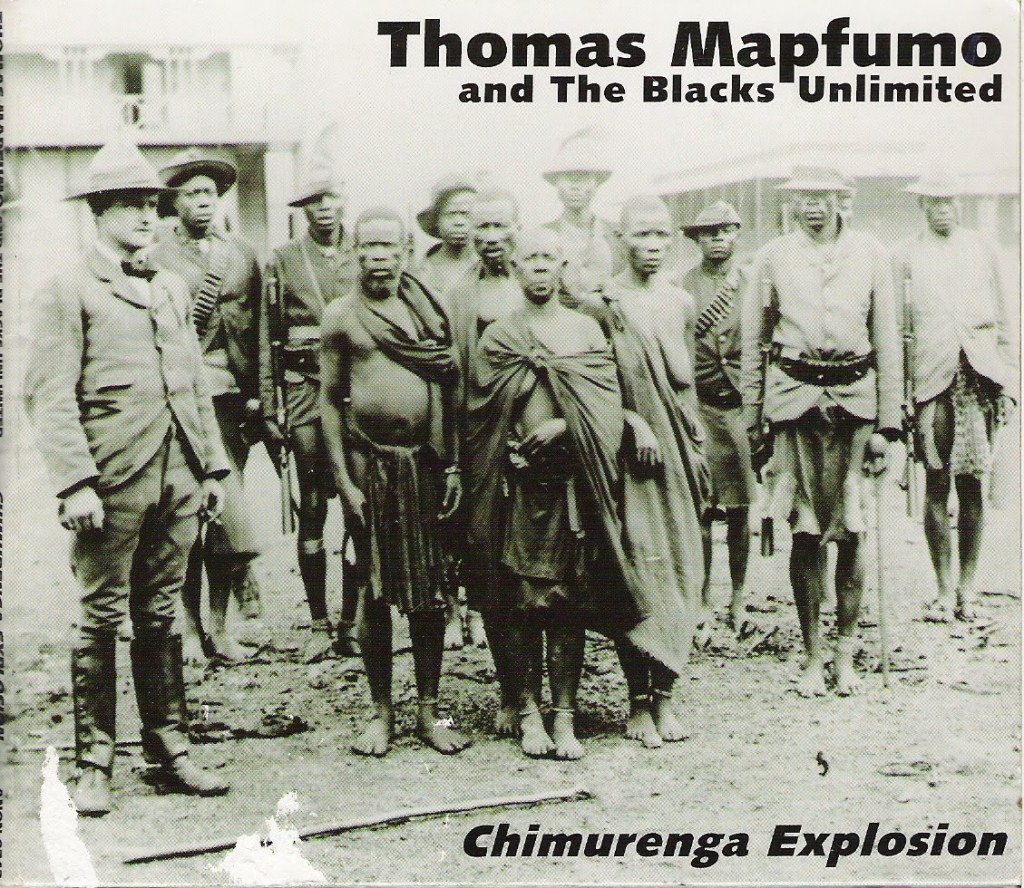
1999 album with "Disaster" and "Mamvemve"
B.E.: Soon after that, he sings “Disaster” and “Mamvemve (Tatters),” songs that were unofficially banned during the 2000 elections, when Mugabe’s constitution went down to defeat, and he nearly lost the Parliament. This is where the real showdown between Mapfumo and the government unfolds. Set the scene historically and politically for this confrontation.
M.C.: Again, you are really looking at a long process whereby systems of policymaking and implementation are falling victim to a different kind of politics that is unrepresentative. You can trace this back to the era of "Corruption," when Mapfumo sings about corruption. But prior to “Mamvemve” the album Chimurenga 98 had already launched this caustic critique. So when "Mamvemve" and other songs come in 1999, it's no surprise to anyone that, well, this is uncomfortable music in the ears of the government. So the "Mamvemve," the “tatters,” that he sings about I think is not just limited to the effects of land reform. It's about this different kind of politics of general mismanagement. When you do the popular thing in the wrong way, of course you are bound to cultivate hunger.
B.E.: We are running short on time, so I'm going to jump ahead closer to the present. What do you think has been the impact of Thomas Mapfumo’s music in Zimbabwe since he went into exile? That would be either 2000, when he moved his family to Oregon, or 2004, when he last performed in Zimbabwe. Some songs we might reference here: “Big in America,” “Masoja Ne Mapurisa (The Soldiers and the Police)” “Kuvarira Mukati (Suffer in Silence)” and “Ruregerero (Forgiveness).” How do Zimbabweans feel about Thomas music produced in exile?
M.C.: There has been I think disenchantment, especially among the fans, people who had grown up listening to Mapfumo. They were very sad to see him leaving, of course. The kind of impact that he has made from here is not the same Mapfumo that people had known. Exile does things to everyone. Even to the guerrillas who lived for years and waged the independence war from the neighboring countries. Exile has the capacity to disenchant, maybe even to kill your spirit. So the kind of music, or productions, that you see coming from Mapfumo here in the US, a lot of the songs have maintained the caustic attack on the bad politics. “Kuvarira Mukati,” from the CD Rise Up (2004) actually says “We took the land, which is what we were crying for. So let us do mushandirapamwe – let us work together.” You also find a similar message in “Ruregerero” – which is that we cannot prosper by pursuing vindictive politics as if we don’t know what we want as a nation. You have the conciliatory message as a necessary step to rebuilding. The basic idea is that why don't we do our politics together? Again tying back to his foundational message in the early independence songs. The land is ours. We took it. Let's work together to rebuild the economy. So that is part of what complicates Mapfumo’s politics on land and nation.
But as we know, part of what drove Mapfumo into exile is the personal politics that I was talking about between him and maybe some members of the government. If you remember, Mapfumo got accused of buying stolen cars. He believes somebody was trying to set him up. So that was around 2000. Then he goes back and stages sold-out concerts in 2001, 2002, up to 2004, and nobody touches him. Nobody asks him about the cars. So he believes that, "Well, this is a bigger plot.” I'm sure he has people that he speaks to, maybe from the inner circles, who know what might be happening. The police seized those cars and parked them at a police station in Harare, but Mapfumo told me that no one can account for them any more. Which suggests that somebody has stolen the supposedly stolen cars. So there is a lot of personal politics that I think has kept Mapfumo outside of Zimbabwe in the last few years. And a lot of that might also inform his discography.
B.E.: The song "Masoja ne Mapurisa" was released on a live album from the UK in 2004. And when it appeared, there were attacks on flea markets where the CD was being sold, quite a violent reaction. The song pretty directly takes aim at the police and their tactics of harassing people for political purposes. You remember this incident?
M.C.: Well, I know that that song was supposed to be part of his Chaputika album, which basically means, "It has exploded." And when things explode, of course, the villain is supposed to be run out of town, and the villain tries to command the soldiers and the police to shoot at the people. But what will he do when they refuse? So again, that is a very unflattering message about the politics, so whoever is in power won't feel comfortable with insinuations that the same police and soldiers that he relies on might very soon chase him out of town. What I know is that that album actually got lost in the works. Twice. After recording, he goes back and he's told, "We can't find it anymore. It got lost." Or “we thought we served it on the computer but actually we didn’t!” So he records it again, and same “mistake.”
B.E.: This is why the song only appeared in this live UK CD, which was also titled Chaputika.
M.C.: So that's of course sabotage, which was not limited to Mapfumo. People like Leonard Zhakata have gone through the same kinds of sabotage and efforts to silence them.
B.E.: And it's quite an art form, isn't it? They don't just issue a ban. They use these roundabout methods.
M.C.: Yes, of course.
B.E.: So let’s talk about the present, almost 10 years after Thomas’s exile began. Mugabe and his regime remain in place. He got away with Murambatsvina, a massive leveling of entire Harare neighborhoods in 2005; he has benefited from a remarkable diamond wealth discovery; he has gotten a firm grip on the independent press; and despite sickness, he now seems determined to run for another term. Referencing any of these developments, or others, describe the present state of Zimbabwe.
M.C.: Well, I think it's a mixed kind of atmosphere, where you have a lot of hope, but also disenchantment—even with the kinds of alternatives that people thought might change things in the right way. Especially when we look at the government of national unity [formed between ZANU and MDC after the disputed 2008 elections], some of the voices that people voted into office have actually proved to be even worse. So it's a disenchanting moment to many people due to lack of good alternatives. Looking through the kinds of economic policies that both parties in the national government, the national unity government, are proposing. The kinds of policies that they are running with as the country edges towards elections, they are two diametrically opposed policies. Of course the ZANU-PF segment has moved more and more towards the left, which to many people is populist politics in terms of indigenizing the economy, extending this policy beyond the land to actually encompass the mines and industries. Because a lot of minerals are being discovered and exploited at the commercial scale in Zimbabwe today, which is very good news for the economy. But that has raised a lot of questions about the politics of allocating those resources—who is doing the mining, and in whose interest? Those kinds of things.
On the other hand, we have the MDC segment of the government, which is run really on the strength, or lack thereof, of neoliberal policies. If you remember, in the early 2000s, the leader condemned the fast-track land reform, telling Zimbabweans that if they vote him into office he would return the farms to the whites. He has since been condemning the idea of indigenizing the economy, promising the electorate jobs that would result from foreign investment instead. So those two kinds of diametrically opposed policies have Zimbabweans really debating things based on those two tacks on the economy, and on their future. So beyond personalities and what each party might actually do if elected, these are policies that are again deeply anchored on our economic history as a country.
Thomas Mapfumo (Eyre 2012)
B.E.: Looking back on all this history, do you have any overarching thoughts on Mapfumo’s lasting legacy in Zimbabwe? Put another way, when they write the history 50 years from now, what do you think will they say about him?
M.C.: What they will say about him? Well you are doing a book about Mapfumo as I am about the history of the country’s music. So whether it's 50 years from now or it is actually even now, people are saying things. Mapfumo has made his history as an individual. He has made lasting impressions in Zimbabwe music, but also in popular politics, which is really kind of unsurpassable. In 2000, you remember, he was named the “Person of the Century” by Parade magazine. Whatever that was meant to do by whoever did that I don't know. But, well, clearly he is somebody who has really raised his voice and who sings what he wants in the same way that Steve Biko wrote what he liked. And of course, when you do that, you have to stand up to the politics that don't entertain saying or writing or singing what you like. So it's that legacy of resistance. The legacy of Chimurenga music is resistance.
However, people will look at resistance and ask: what are you resisting? That might be subject to debate, because that is bound to change over time. Are you resisting a particular kind of personalized politics? Or are you still struggling for the common good? Historians are going to of course write that history differently.
B.E.: I imagine they will. And also, we have to think about this whole question of stigmatized traditional culture. I think this is also a big part of Mapfumo’s legacy.
M.C.: Yeah, well, that's been some kind of enduring process, but one that no policymaker has really sat down to think through and to throw up into national public discourse. Yet it is one of the foundational issues to the way people do things. It's the question that hasn't really been asked, yet it is the question that was actually asked by the colonial regime, by the missionaries when they intervened into what it means to be African. That's the kind of question, the kind of portal through which they entered into the African life world. That stigmatization tells you how much the colonial system succeeded in reengineering African being, a process that you prosecute at the cultural front. So it is important to actually address that question, because it is foundational to a lot of questions that have emerged subsequently. It is the one question that really defines what it means to be postcolonial African – the gist of the postcolonial condition in Zimbabwe and elsewhere in our formerly colonized world.
So unless that question has been addressed in terms of the arts of knowledge and knowledge production, in terms of our languages and value systems, it remains a bad legacy. Language is key. You can't really speak about development without addressing questions of language, and questions of indigenous knowledge. The people who fought and freed Zimbabwe did not do that using borrowed languages and registers and idioms. You develop by revaluing and re-evaluating your own registers of knowledge—and that includes language. So Mapfumo raised the issues and even today, he continues to raise the issue of the need for cultural transformation, which I think is not too late, but, well, we are talking about the kind of crop that makes policy today. Is it the right kind of crop to change themselves? Of course the answer does not seem encouraging. We need a different kind of mentality.
B.E.: You know, I wonder. When I first asked you about Mapfumo's legacy, you spoke about resistance. But I also wonder how this cultural message will be interpreted in the long run. Sometimes people misinterpret it. They think that Thomas is saying Zimbabweans have to reject modern life and go back to being the way they were, unquestioningly embrace all the old traditional ways, and religion and ancestor interactions, all of that. But I don't think that's really what he is saying. I have spoken to him about this. And he says of course there are things that have to be thrown away because they don't make sense in the world of today. But he does feel that very important things have been lost. And I think that more than all of his comments about corruption and politics, he would like to be remembered more for this call for cultural transformation. That's my sense.
M.C.: He references that in many of his works, and let me say this on the question of our spiritualities as Africans, the need to revalue the place of our ancestors in our value systems – that’s exactly what Mapfumo is advocating. There is nothing backward or old about it. That’s us. It does not mean going back anywhere – because change only happens forwards – but you don’t go forward by running away from yourself. To say ancestors in Zimbabwean cultures is to say our mothers and fathers, our grandparents and their forebears. Nobody thinks their parents and grandparents are demons the way missionaries taught Africans to think; they are us in a very real sense. And our African spirituality recognizes their centrality in our being. That’s the constant message in a lot of the songs that Mapfumo composed throughout his career, including “Magariro” that we have talked about. And this is not limited to Mapfumo.
B.E.: Before we go, Mhoze, tell me a little bit about the book you're working on.
Troy, New York (Eyre 2003)
M.C.: I have been researching Zimbabwean music since my undergraduate years at the University of Zimbabwe, in 2000. I continued this work as a graduate student, writing my Ph.D. thesis on the cultural and political contestations that revolved around music from the 1930s-2000s, a wide spectrum time-wise. So of course, thinking in terms of the economics of publishing, you cannot really cover that adequately. Publishers will not allow you to do all that. So what I'm doing with my first book is to understand specially the key debates surrounding the missionary impact on African cultures and the place of music in Zimbabweans’ self-liberation. So the book is called African Music, Power and Being: Colonial Zimbabwe. I trace the story of music and power from the late 1800s up to the early 1970s, and I have three chapters in there where I really dig into what missionaries tried to do, their thoughts and discourses, and the power of that discourse in terms of molding African being. Then I end this by looking at how Africans use the same kinds of instruments to free themselves. So I talk quite a bit about Thomas Mapfumo, Zexie Manatsa, people like Comrade Chinx and others. I look at how that music remained really an unconquered terrain, which Africans deployed in their struggle for independence.
So what I'm trying to do in that book is to again shift historical attention from this very present kind of writing that you see in existing literature. It's interesting. When I was looking for potential publishers, one person suggested, "Why don't you write about what Mugabe is doing with traditional dance and music?" I thought, “Why do you think I would want to write about that?” That idea, the focus on Zimbabwe in its present days, what Mugabe might be doing, what Jonathan Moyo was doing with the radio, there is actually nothing new about that. So that's one key contribution in my book. A lot of their ideas, a lot of their strategies really come straight from the colonial notebook, from the missionaries’ notebook. So as I think about the sequel to this first book – music in postcolonial Zimbabwe – very little will be surprising.
B.E.: That's very interesting. Where are you at in the publication process?
M.C.: I'm actually about to send this off to a publisher in the next few weeks. All the writing and revising is finished.
B.E.: Excellent.
At World Financial Center, NYC (Eyre 2012)
M.C.: So will you be talking to Thomas soon?
B.E.: I expect I will. Anything you want me to pass on?
M.C.: Well, just say hi. But there's been this talk that he might be heading to Zimbabwe. It might just be the press.
B.E.: I spoke with Gilbert, Thomas’s guitar player, about that. I know there was a story a few months ago about a wealthy Zimbabwean businessmen who wanted Thomas to come and offered to pay for everything.
M.C.: Yes, Chiyangwa.
B.E.: Now I gather there's a new story. Gilbert did not seem to think it was going to happen. But let's wait and see what Thomas says.
M.C.: That would be a new turn in the story.
B.E.: It sure would. Thank you so much, Mhoze. Do you feel there's anything we've left out?
M.C.: No. I think we have covered things well.
Thomas Mapfumo and Angelique Kidjo (Eyre 2004)
Related Audio Programs
